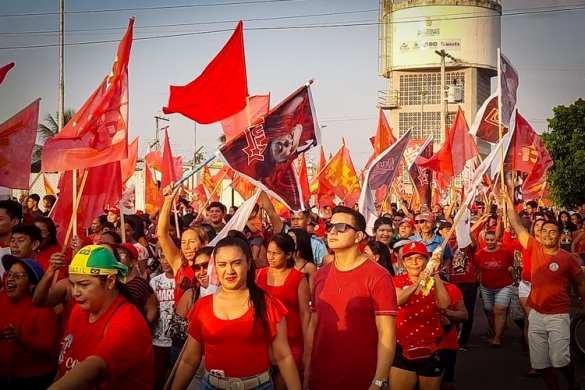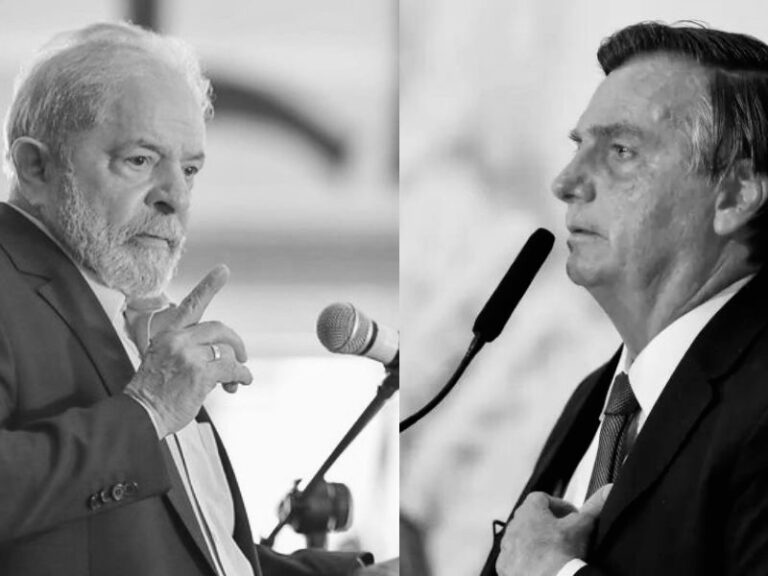Whatever the final outcome of Brazil’s presidential contest, the results of the first round have been a harsh (and salutary) lesson for the left about the serious difficulties that progressive forces face in Brazil.
Former President Luis Inácio Lula da Silva, of the Workers Party (PT), emerged ahead in the general elections on Sunday 2 October, gaining 48.4% of the vote against the 43.2% going to the incumbent, Jair Bolsonaro. However, even though Lula received over six million more votes than his rival, the result dashed decisively the hopes of many on the left that the election in 2018 of the extreme right-wing Bolsonaro was a freak anomaly, the result of the tumultuous years that followed the impeachment of the PT president, Dilma Rousseff.
The results show that Bolsonarism, far from being forced into retreat, has emerged as a strong and cohesive force. As several commentators in Brazil have pointed out, the election was ‘an electoral defeat but a political victory’ for Bolsonarism. The big losers were the more moderate right-wing parties. Bolsonarism, with its extreme neo-fascist views, has usurped them as the dominant voice of the right. The PSDB party of former President Fernando Henrique Cardoso had its worst result this century.
This, says Roberto Andrés, a lecturer in architecture and urbanism in the UFMG (The Federal University of Minas Gerais), has transformed the political dispute into ‘something much more violent, much less civilised, much more destructive and much more difficult for progressive forces to combat’. Valério Arcary, retired lecturer in history in the São Paulo Institute, IFSP, says that ‘the campaign [for the second round of the election] will be the most difficult since the end of the military dictatorship’.
It has become brutally clear that the left seriously underestimated Bolsonarism — something that Arcary calls ‘the most serious mistake ever made by the Brazilian left’. In part, it is understandable because the polls indicated that Lula was comfortably ahead. It seems that some Bolsonaristas are ashamed to own up to their choice, whereas others refuse to collaborate with opinion polls, seeing them as purveyors of ‘fake news’.
It has become painfully clear that victory for the PT in the second round, to be held on 30 October, is by no means assured. Lula supporters are understandably demoralised and deflated, and it may take time for them to rebound. And it is never easy to defeat an incumbent president: Bolsonaro has the state machinery in his hands and has invested billions of reais to win over voters, bringing down the cost of fuel, among other measures. His supporters feel buoyed by the result, with so many predicting that they would lose heavily.
Most important of all, Bolsonaro will play dirty, using all the tricks of the trade. He has already hinted that he was denied victory in the first round by fraud, claiming that in a clean election he would have won 60 per cent of the vote. If the PT wins by a small margin, Bolsonaro may well call his supporters, including the military police, into the streets to dispute the result, possibly to more effect than when Trump tried a similar tactic.

For Lula to win, the party needs to up the ante. It was evident to many commentators that the PT was strongly mobilised in the north and northeast, where it virtually swept the board, whereas in the south and south-east, where Bolsonaro did well, the PT’s campaign was lukewarm. João Pedro Stédile, the veteran leader of the Landless Movement (MST), has called on petistas and all other left-wing activists, to get into the streets to stop the disaster of a Bolsonaro victory. The situation, he says, demands a full-throttled response.
While many in the PT agree, it may not have helped that Lula shrugged off the election result, saying it was merely adding ‘extra time in a match already won’. Elio Gaspari, a much-respected, left-wing journalist who came to prominence during the 1964-85 military dictatorship, said that Lula may be committing ‘the ultimate mistake in a campaign that began well but in one terrible instant got lost’.
The results from the congressional elections, also held on 2 October, support the view that Brazil has become increasingly polarised.
It is clear that the extreme right, which has become the strongest group in Congress, is controlled by Bolsonaro and his sons. His close allies, many of them discredited by their terms of office as minsters, were all elected, mostly to the Senate. The names include former environment minister Ricardo Salles, former minister for the family Damares Alves (an evangelical pastor), former health minister Eduardo Pazuello and vice-president Hamilton Mourão. The last two are retired generals. It is significant that Sérgio Moro, the federal judge who led the controversial enquiry into the Car Wash (Lava-Jato) corruption scandal, was only elected because halfway through his campaign he decided to join Bolsonaro’s party.
Moysés Pinto Neto, lecturer in philosophy in the Lutheran University of Brazil (ULBRA), says that, for the left, ‘it’s the worst Senate Brazil has ever had’.
However, the outcome was by no means entirely bad for the left. The PT increased its representation and has become the second largest bench. In particular, the left has become stronger in the Chamber of Deputies, where it controls a third of the seats. This gives it leverage.

Pinto Neto suggests that ‘the most interesting result is the internal renovation of the left-wing benches, which now include people from other areas outside the political parties, like representatives of indigenous peoples, people of colour, the LGBTQI+ movement and feminists’. As well as this, some strong names, like Guilherme Boulos, the leader of Brazil’s homeless movement (MTST), and former environment minister under Lula, Marina Silva, were elected. With over a million votes, Boulos was elected federal deputy with more votes than other candidate in São Paulo state.
Pinto Neto is excited by the growing strength of groups outside the political parties. ‘It represents a deepening of social struggle, which is no longer represented by a subject-from-a-party, but by those directly involved in the struggle’. This means, he says, that ‘people will be more directly involved in combatting the root of problems like racism’.
In the longer term, it may be these new leaders who will lead the struggle, proposing new and exciting ways forward. But these forces are not yet strong enough to carry out this role. Many of these leaders, no fans of Lula, who they see as a spent force with no new ideas, believe none the less that it is crucial that he wins, for the prospect of another four years of Bolsonaro in power is truly frightening. As Arcary says, ‘Bolsonarism would mean a historic defeat for popular forces, the working class, the oppressed, women, people of colour, the LGBTQIA+ and environmentalists. A second Bolsonaro government would be a catastrophe’.
Even if Lula wins, he will find it difficult to govern. One of Lula’s characteristics is his ability to compromise, to negotiate an acceptable deal with opponents. But, if Bolsonaro is defeated, his party will not compromise. Its only goal will be to sabotage the new Lula government. The sociologist, José deSouza Martins, warns, ‘the new composition of National Congress may compromise the governability of a centre-left government’.
Even so, a Lula government may well be able to halt bills, planned by Bolsonaro, that would bring further destruction to the country’s social fabric and even greater devastation of the Amazon Forest and other precious ecosystems. This is crucial, as there are already indications that uncontrolled felling, occurring at breakneck speed, is already pushing parts of the Amazon Forest over the ‘tipping point into which it suffers irreversible savannization.
Brazilian politics is entering a new and difficult phase. Martins believes that, whether Bolsonaro wins or is defeated, he will be a powerful presence on the political scene for many years. He might well arrange for someone from ‘the firm’, which in his case is his sons, to run for thepresidency in 2026, he says. ‘This would suggest a long period of reversal for the left. In practice, a government which is both anti-capitalist and anti-social’.
Back in 2002 Lula was seen as part of the Pink Tide, a left-wing wave that, it was hoped, would transform Latin America. The tide petered out, disappointing many. Today Lula’s role may turn out to be more modest but possibly even more important – to preserve a future for ordinary Brazilians and the global climate.

